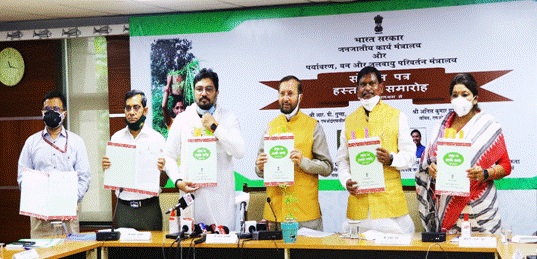Joint Communication for more effective implementation of the Forest Rights Act signed by Environment and Tribal Affairs Ministries
Will improve participation of STs and forest dwellers in forest management and ensure that Forest Rights Act is implemented in letter and spirit: Shri Arjun Munda
The joint communication indicates a paradigm shift from working in silos to achieving convergence between Ministries and Departments: Shri Prakash Javadekar
A “Joint Communication” was signed by Shri R.P. Gupta, Secretary, Ministry of Environment, Forest & Climate Change (MoEFCC), and Shri Anil Kumar Jha, Secretary, Ministry of Tribal Affairs (MoTA), in the presence of Minister of Environment, , Shri Prakash Javadekar and Minister of Tribal Affairs, Shri Arjun Munda today in New Delhi.

The Joint Communication, addressed to all Chief Secretaries of States/UTs, pertains to more effective implementation of the Forest Rights Act(FRA), 2006 and for harnessing the potential for livelihood improvement of the Forest Dwelling Scheduled Tribes (FDSTs) and other Traditional Forest Dwellers (OTFDs).
Speaking on the occasion, Minister of Tribal Affairs, Shri Arjun Munda stated that tribals and other forest dwellers can contribute significantly in efforts towards climate change through preservation of biodiversity, environmental conservation and enhancing forest cover.
In his key-note address, Shri Munda said that today’s joint communication is oriented towards the rights and duties of the forest dwellers and to improve participation of such communities in the process of forest management.
आदिवासी समुदाय के विकास और सशक्तिकरण के लिए प्रधानमंत्री श्री @narendramodi जी की नेतृत्व वाली सरकार प्रतिबद्ध है. आदिवासियों के सर्वांगीण विकास और वन अधिकार अधिनियम को सही मायनों में लागू करने के लिए आज जनजातीय कार्य मंत्रालय एवं वन,पर्यावरण एवं जलवायु परिवर्तन मंत्रालय pic.twitter.com/myETRdwzBn
— Arjun Munda (@MundaArjun) July 6, 2021
The Minister further informed the gathering that a meeting was held between both ministers on 10th August, 2020 which was intended to resolve issues in ensuring community participation in forest management and today’s joint communication, is a culmination of the series of consultations done after that.
The Environment Minister, Shri Javadekar said that the joint communication indicates a paradigm shift from one of working in silos to achieving convergence between Ministries and Departments, and is a very positive development.
“Government of India is committed for development of Tribes and Tribal areas. The number of sanctioned Ekalavya Model Residential Schools (EMRS) has gone up to 620. Similarly, the launch of Van DhanYojana and increasing the number of Minor Forest Products (MFP) in the bracket of Minimum Support Price (MSP) from 10 to 86 in the last few years has supported tribes immensely in improving their incomes and livelihood prospects.” said the Environment Minister.
गत सात वर्षों में 5 लाख से अधिक पट्टे वनवासियों और आदिवासियों को दिए गए। @TribalAffairsIn का बजट पहले 3800/- करोड़ होता था आज ये 7200 करोड़ है। जहाँ पहले 10 Minor Forest Produce को #MSP मिलता था, वहीँ आज मोदी सरकार ने ये संख्या बढ़ा कर 86 कर दी है। pic.twitter.com/DKHjdtzJM0
— Prakash Javadekar (@PrakashJavdekar) July 6, 2021
On the occasion Minister of State for Tribal Affairs,Smt. Renuka Singh Saruta expressed happieness and hailed the the joint communication as historic that would bring all the stakeholders together and hoped that it will prove beneficial for forest dwellers.
Shri Babul Supriyo Minister of State for Environment, gave a call for action to achieve objectives of Forest Rights Act, 2006 in its right earnest. The step will go a long way for the benefit of not only forest conservation and biodiversity as well as for the welfare of the Scheduled Tribes & OTFDs.
The event was attended by more than 300 participants including State Government officials such as Principal Secretaries/Secretaries in the Forest, Revenue and Tribal Welfare Departments, Principal Chief Conservators of Forest, Commissioners/Directors of Tribal Welfare Departments, Directors of Tribal Research Institutes (TRIs) as well as members from NGOs and partnering organizations.
Click Here For Salient Features of Joint Communication
***
NB/GK
